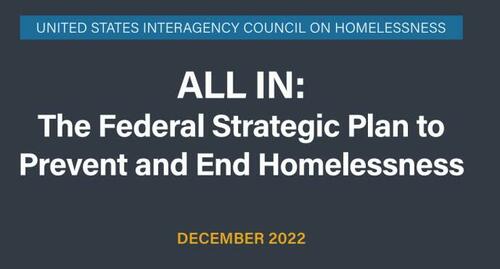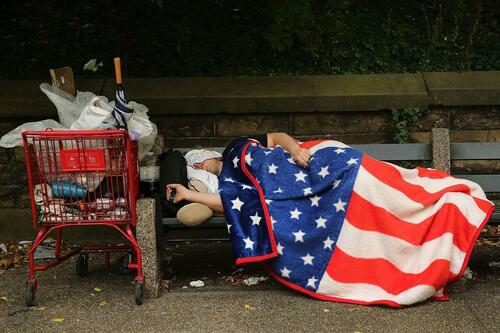
Authored by Mike Shedlock via MishTalk.com,
Obama's "Housing First" plan to end homelessness worked so well that President Biden adopted the idea in December of 2022. We are now "ALL IN"...
Homeless Funding Opportunity for Housing First
Let's start with a HUD Funding Opportunity from 2013.
The CoC Program is designed to promote a community-wide commitment to the goal of ending homelessness; to provide funding for efforts by nonprofit providers, States, and local governments to quickly re-house the homeless while minimizing the trauma and dislocation caused by homelessness; to promote access to and effective utilization of mainstream programs by the homeless; and to optimize self-sufficiency among those experiencing homelessness.
Housing First is a model of housing assistance that is offered without preconditions (such as sobriety or a minimum income threshold) or service participation requirements, and rapid placement and stabilization in permanent housing are primary goals. Research shows that it is effective for the chronically homeless with mental health and substance abuse disorders, resulting in fewer inpatient stays and less expensive interventions than other approaches. PSH projects should use a Housing First approach in the design of the program.
Obama Promised to End Homelessness This Year
The Wall Street Journal comments on Obama's Promise to End Homelessness This Year
It may be hard to believe looking at the current state of major American cities, but 2023 was supposed to be the year that all types of homelessness would be eradicated. That’s what the Obama administration promised when in 2013 the Department of Housing and Urban Development formally changed the federal government’s homelessness policy to “housing first,” under which homeless people receive federally funded housing vouchers with no strings attached. Things haven’t panned out as the administration planned.
Team Obama ignored a harsh reality of homelessness: It is overwhelmingly a problem of untreated mental illness and substance-use disorder. California Policy Lab, a nonpartisan research institute at the University of California, found in 2019 that 78% of the homeless population in America reported having mental-health conditions, and 50% said mental illness contributed to their loss of housing. Additionally, 75% of the homeless said they struggled with substance abuse, and 51% said drug or alcohol use contributed to their loss of housing.
Before 2013, HUD strongly encouraged and often required that Continuum of Care organizations provide treatment and job training and that they make housing vouchers conditional on participation in those programs. In 2013 the Obama HUD told all funding recipients that they instead had to adopt “a Housing First approach” without “service participation requirements.”
That change precipitated a dramatic increase in homelessness. HUD data show that unsheltered homelessness rose 20.5% from 2014 to the beginning of 2020, before Covid hit.
Inexplicably, homelessness is treated differently. Policy makers act as if it’s simply an issue of people not having houses, rather than a complex problem often rooted in mental illness and substance-abuse disorders.
Research shows that "housing first works."
What research was that?
By any chance did the National Association of Realtors or National Association of Homebuilders sponsor the research?
Spotlight California
CAL Matters reports California Accounts for 30% of Nation’s Homeless.
-
Country’s highest homelessness rate, with 44 people out of every 10,000 experiencing homelessness.
-
Largest increase in its homeless population of any other state from both 2020-22 (6.2%) and 2007-22 (23.4%), whereas Florida — a state often in Gov. Gavin Newsom’s crosshairs as he spars with its Republican governor Ron DeSantis — saw a 5.6% decrease from 2020-22 and notched the country’s biggest decrease from 2007-22 (46%).
-
California had nine times more unsheltered people than Washington, the state with the next highest number (115,491 people compared to 12,668 people).
Project RoomKey
-
Los Angeles Mayor Karen Bass is set today to launch a program to start moving the city’s estimated 40,000 homeless people into hotels and motels, the Associated Press reports. The plan appears to be modeled on Newsom’s Project Roomkey and Homekey.
-
Bass, who declared a homelessness state of emergency on her first day in office last week, also issued a sweeping executive order Friday that aims to significantly speed up the development of 100% affordable housing by requiring city agencies to finish reviewing applications within 60 days — instead of the typical six to nine months.
Biden to the Rescue
Please consider the Biden Administration's Plan to Prevent and End Homelessness.
Every American deserves a safe and reliable place to call home. It’s a matter of security, stability, and well-being. It is also a matter of basic dignity and who we are as a Nation.
Yet many Americans live each day without safe or stable housing. Some are in emergency shelters. Others live on our streets, exposed to the threats of violence, adverse weather, disease, and so many other dangers exacerbated by homelessness. Both the COVID-19 pandemic and the reckoning our Nation has faced on issues of racial justice have also exposed inequities that have been allowed to fester for far too long.
At the same time, we know we can do something about it. That is why I’m proud to present the Biden-Harris Administration’s Federal Strategic Plan to reduce homelessness by 25 percent by January 2025—an ambitious plan that will put us on the path to meeting my long-term vision of preventing and ending homelessness in America. We need partners at the State and local levels, in the private sector, and from philanthropies to all play a part in meeting this goal.
Housing First Worked So Well That ....
We are proud and pleased to present this new plan, which restores the importance of Housing First.
Seems like the new plan is the same as the old one that did not work.
There is however a name change. The plan is no longer the Obama Housing First plan. It's now the Biden-Harris Housing First plan.
And the Data
It means being guided by the data and evidence that some Americans who face ongoing discrimination are disproportionately overrepresented among those experiencing homelessness—especially people of color, LGBTQI+ people, and people with disabilities. It means recognizing that experiencing the crisis of homelessness is a form of significant trauma that can impact individuals and families for decades and generations. Solving homelessness means delivering help to the people who need it most and who are having the hardest time. It means putting housing first, along with the person-centered supports needed to succeed and thrive.
Proud of the Work
While we acknowledge there is much work ahead, we are proud of the work this administration has done to address homelessness.
If we give everyone a house, free food, insurance, etc. what would it cost?
LA Spends Up to $837K Per Unit to House a Mere 5,600 of Over 40,000 Homeless
On March 24, 2022 I noted LA Spends Up to $837K Per Unit to House a Mere 5,600 of Over 40,000 Homeless
Key Points
-
California had 28,464 Homeless in 2016.
-
LA then passed proposition HHH, authorizing $1.2 billion to address the problem.
-
In early 2020, pre-Covid, the city had 41,250 homeless. There are no current homeless stats and due to Covid are undoubtedly much higher.
-
The city is building units to address the problem. 1,200 units have been completed.
-
4,400 units are in construction.
That's "housing first" in actual practice. It's certainly something to be proud of.
* * *
Authored by Mike Shedlock via MishTalk.com,
Obama’s “Housing First” plan to end homelessness worked so well that President Biden adopted the idea in December of 2022. We are now “ALL IN”…
Homeless Funding Opportunity for Housing First
Let’s start with a HUD Funding Opportunity from 2013.
The CoC Program is designed to promote a community-wide commitment to the goal of ending homelessness; to provide funding for efforts by nonprofit providers, States, and local governments to quickly re-house the homeless while minimizing the trauma and dislocation caused by homelessness; to promote access to and effective utilization of mainstream programs by the homeless; and to optimize self-sufficiency among those experiencing homelessness.
Housing First is a model of housing assistance that is offered without preconditions (such as sobriety or a minimum income threshold) or service participation requirements, and rapid placement and stabilization in permanent housing are primary goals. Research shows that it is effective for the chronically homeless with mental health and substance abuse disorders, resulting in fewer inpatient stays and less expensive interventions than other approaches. PSH projects should use a Housing First approach in the design of the program.
Obama Promised to End Homelessness This Year
The Wall Street Journal comments on Obama’s Promise to End Homelessness This Year
It may be hard to believe looking at the current state of major American cities, but 2023 was supposed to be the year that all types of homelessness would be eradicated. That’s what the Obama administration promised when in 2013 the Department of Housing and Urban Development formally changed the federal government’s homelessness policy to “housing first,” under which homeless people receive federally funded housing vouchers with no strings attached. Things haven’t panned out as the administration planned.
Team Obama ignored a harsh reality of homelessness: It is overwhelmingly a problem of untreated mental illness and substance-use disorder. California Policy Lab, a nonpartisan research institute at the University of California, found in 2019 that 78% of the homeless population in America reported having mental-health conditions, and 50% said mental illness contributed to their loss of housing. Additionally, 75% of the homeless said they struggled with substance abuse, and 51% said drug or alcohol use contributed to their loss of housing.
Before 2013, HUD strongly encouraged and often required that Continuum of Care organizations provide treatment and job training and that they make housing vouchers conditional on participation in those programs. In 2013 the Obama HUD told all funding recipients that they instead had to adopt “a Housing First approach” without “service participation requirements.”
That change precipitated a dramatic increase in homelessness. HUD data show that unsheltered homelessness rose 20.5% from 2014 to the beginning of 2020, before Covid hit.
Inexplicably, homelessness is treated differently. Policy makers act as if it’s simply an issue of people not having houses, rather than a complex problem often rooted in mental illness and substance-abuse disorders.
Research shows that “housing first works.”
What research was that?
By any chance did the National Association of Realtors or National Association of Homebuilders sponsor the research?
Spotlight California
CAL Matters reports California Accounts for 30% of Nation’s Homeless.
-
Country’s highest homelessness rate, with 44 people out of every 10,000 experiencing homelessness.
-
Largest increase in its homeless population of any other state from both 2020-22 (6.2%) and 2007-22 (23.4%), whereas Florida — a state often in Gov. Gavin Newsom’s crosshairs as he spars with its Republican governor Ron DeSantis — saw a 5.6% decrease from 2020-22 and notched the country’s biggest decrease from 2007-22 (46%).
-
California had nine times more unsheltered people than Washington, the state with the next highest number (115,491 people compared to 12,668 people).
Project RoomKey
-
Los Angeles Mayor Karen Bass is set today to launch a program to start moving the city’s estimated 40,000 homeless people into hotels and motels, the Associated Press reports. The plan appears to be modeled on Newsom’s Project Roomkey and Homekey.
-
Bass, who declared a homelessness state of emergency on her first day in office last week, also issued a sweeping executive order Friday that aims to significantly speed up the development of 100% affordable housing by requiring city agencies to finish reviewing applications within 60 days — instead of the typical six to nine months.
Biden to the Rescue
Please consider the Biden Administration’s Plan to Prevent and End Homelessness.
Every American deserves a safe and reliable place to call home. It’s a matter of security, stability, and well-being. It is also a matter of basic dignity and who we are as a Nation.
Yet many Americans live each day without safe or stable housing. Some are in emergency shelters. Others live on our streets, exposed to the threats of violence, adverse weather, disease, and so many other dangers exacerbated by homelessness. Both the COVID-19 pandemic and the reckoning our Nation has faced on issues of racial justice have also exposed inequities that have been allowed to fester for far too long.
At the same time, we know we can do something about it. That is why I’m proud to present the Biden-Harris Administration’s Federal Strategic Plan to reduce homelessness by 25 percent by January 2025—an ambitious plan that will put us on the path to meeting my long-term vision of preventing and ending homelessness in America. We need partners at the State and local levels, in the private sector, and from philanthropies to all play a part in meeting this goal.
Housing First Worked So Well That ….
We are proud and pleased to present this new plan, which restores the importance of Housing First.
Seems like the new plan is the same as the old one that did not work.
There is however a name change. The plan is no longer the Obama Housing First plan. It’s now the Biden-Harris Housing First plan.
And the Data?
It means being guided by the data and evidence that some Americans who face ongoing discrimination are disproportionately overrepresented among those experiencing homelessness—especially people of color, LGBTQI+ people, and people with disabilities. It means recognizing that experiencing the crisis of homelessness is a form of significant trauma that can impact individuals and families for decades and generations. Solving homelessness means delivering help to the people who need it most and who are having the hardest time. It means putting housing first, along with the person-centered supports needed to succeed and thrive.
Proud of the Work
While we acknowledge there is much work ahead, we are proud of the work this administration has done to address homelessness.
If we give everyone a house, free food, insurance, etc. what would it cost?
LA Spends Up to $837K Per Unit to House a Mere 5,600 of Over 40,000 Homeless
On March 24, 2022 I noted LA Spends Up to $837K Per Unit to House a Mere 5,600 of Over 40,000 Homeless
Key Points
-
California had 28,464 Homeless in 2016.
-
LA then passed proposition HHH, authorizing $1.2 billion to address the problem.
-
In early 2020, pre-Covid, the city had 41,250 homeless. There are no current homeless stats and due to Covid are undoubtedly much higher.
-
The city is building units to address the problem. 1,200 units have been completed.
-
4,400 units are in construction.
That’s “housing first” in actual practice. It’s certainly something to be proud of.
* * *
Loading…






